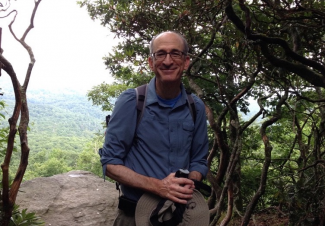Keith Luria
Bio
Keith Luria teaches surveys of European history from the Renaissance through the French Revolution and World History. The subjects he teaches in upper level classes include the history of the Protestant and Catholic Reformations, Early-Modern Gender history, and the history of early-modern France.
Projects
Book project: “A Global Religion: Conversion and Cultural Exchange iin the Early Modern World.”
Book project: “France in the Early Modern World.”
Office Hours
- Mon: 8:30 a.m. – 9:30 a.m.
- Wed: 8:30 a.m. – 9:30 a.m.
Research Publications
Books:
Sacred Boundaries: Religious Coexistence and Conflict in Early-Modern France. Washington, D.C.: The Catholic University of America Press, 2005.
Territories of Grace: Cultural Change in the Seventeenth-Century Diocese of Grenoble. Berkeley: Univ. of California Press, 1991.
Articles & Essays:Forthcoming:
“Narrating Women’s Catholic Conversions in Seventeenth-Century Annam” to appear in “Gender and Conversion in the Early Modern World, eidited by Helen Smith and Simon Ditchfield.”
“Conversion in Early-Modern Europe: Personal Conscience, Confessional Affiliation, and Political Allegiance” in ‘Conversion and the Formation of a Catholic Identity in Early Modern Europe’, edited by Maria Craciun and Jörg Deventer (Brill)
Published
Contributor to published roundtable discussion of “Conversions in Early Modern Europe,” edited by Martin Elbel, Colloquia: Journal of Central European History, 15 (2008): 104-127.
“France: An Overview,” in A Companion to Multiconfessionalism in the Early Modern World, edited by Thomas Max Safley, Brill’s Companions to the Christian Tradition (Leiden: Brill, 2011), 209-238.
“Conversion and the Politics of Personal Identity in Early-Modern France: Benoît de Canfield’s Miraculeuse Conversion,” in Les modes de la conversion confessionelle à l’époque moderne, Biblioteca della revista de storia e letteratura religiosa, Studi 23, edited by Daniela S. Camillocci and Maria Christina Pitassi (Florence: Leo S. Olschiki Editore, 2010), 41-61.
“Conversion and Coercion: Personal Conscience and Political Conformity in Early Modern France,” The Medieval History Journal, 12, 2 (2009):221-247.
“The Power of Conscience? Coexistence and Confessional Boundary Building in Early- Modern France” in Living with Religious Diversity in Early-Modern Europe, edited by C. Scott Dixon, Dagmar Freist, Mark Greengrass (Farnham, UK: Ashgate Press, 2009), 109-125.
“Les frontières du sacré,” Chrétiens et sociétés: XVI-XXe siècles, 15 (2008):1-17
http://chretienssocietes.revues.org/index562.html
Education
B.A. History Brandeis University 1975
M.A. History University of California-Berkeley 1978
Ph.D. History University of California-Berkeley 1982
Area(s) of Expertise
I study early-modern Europe, especially its cultural, religious, gender, and social history of France. I have examined these issues in two books, Territories of Grace: Cultural Change in the Seventeenth-Century Diocese of Grenoble (Berkeley, 1991) and Sacred Boundaries: Religious Coexistence and Conflict in Early Modern France (Washington, DC, 2005). I have also written on topics such as the history of popular culture, religious conversion, and Catholic missions. I am currently interested in the history of religious coexistence, missions in and beyond Europe during the early-modern period, the meanings of religious conversion, and the European encounter with non-European religions during the seventeenth and eighteenth centuries.
